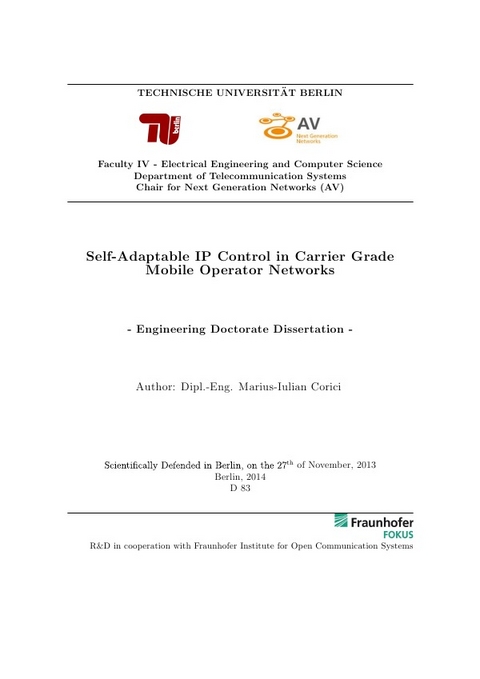
Self-Adaptable IP Control in Carrier Grade Mobile Operator Networks
Seiten
2014
epubli (Verlag)
978-3-8442-9462-0 (ISBN)
epubli (Verlag)
978-3-8442-9462-0 (ISBN)
- Titel leider nicht mehr lieferbar
- Artikel merken
Dissertation on self-adaptable mechanisms for EPC mobile operator network.
The current trend in wireless operator networks is towards deploying
in parallel a large number of heterogeneous access network technologies and core
network functions in order to reach a higher capacity and thus accommodating
the communication needs of a high number of connected devices. However, the
wireless operator network is designed for handling uniformly all subscribers from
the perspective of mobility management, subscription information, resource reservation
and charging. The current architecture corroborated with a high increase
of connected devices requires a new level of scalability to be attained which is not
realizable.
This dissertation provides a framework, named SelfFit, for subscriber oriented
automatic adaptation of connectivity from core network perspective for access
network selection, ecient usage of the core network resources and the data path
adaptation, addressing the previous scalability challenge. In these three directions,
a set of ve innovative self-adaptation concepts for dynamic carrier grade network
infrastructures was developed. The concepts were immediately exemplied as additions
to the current 3GPP Evolved Packet Core (EPC) architecture, for proving
their value in a standard, real-life deployed architecture. Additionally, the functionality
was prototyped on top of the Fraunhofer FOKUS OpenEPC toolkit and
evaluated on complete realistic testbed setups, providing a practical view on how
it can be realized as part of future core network products.
For assessing the limitations of existing technologies as well as of the proposed
solutions, a rigorous generic evaluation framework was developed including the requirements
denition, a simplied network model, qualitative metrics for assessing
heterogeneous technologies, and comparative qualitative testbed measurements.
The evaluation framework enables the reader to grasp a clear evidence of the innovation
value included in this dissertation from innovative idea to pre-product
prototyping.
The current trend in wireless operator networks is towards deploying
in parallel a large number of heterogeneous access network technologies and core
network functions in order to reach a higher capacity and thus accommodating
the communication needs of a high number of connected devices. However, the
wireless operator network is designed for handling uniformly all subscribers from
the perspective of mobility management, subscription information, resource reservation
and charging. The current architecture corroborated with a high increase
of connected devices requires a new level of scalability to be attained which is not
realizable.
This dissertation provides a framework, named SelfFit, for subscriber oriented
automatic adaptation of connectivity from core network perspective for access
network selection, ecient usage of the core network resources and the data path
adaptation, addressing the previous scalability challenge. In these three directions,
a set of ve innovative self-adaptation concepts for dynamic carrier grade network
infrastructures was developed. The concepts were immediately exemplied as additions
to the current 3GPP Evolved Packet Core (EPC) architecture, for proving
their value in a standard, real-life deployed architecture. Additionally, the functionality
was prototyped on top of the Fraunhofer FOKUS OpenEPC toolkit and
evaluated on complete realistic testbed setups, providing a practical view on how
it can be realized as part of future core network products.
For assessing the limitations of existing technologies as well as of the proposed
solutions, a rigorous generic evaluation framework was developed including the requirements
denition, a simplied network model, qualitative metrics for assessing
heterogeneous technologies, and comparative qualitative testbed measurements.
The evaluation framework enables the reader to grasp a clear evidence of the innovation
value included in this dissertation from innovative idea to pre-product
prototyping.
Marius Corici received his Diploma in the Science of Systems and Computers –Computers Engineering from University “Politehnica” of Bucharest, Romania in 2005. Since then he is part of the Next Generation Network Infrastructures (NGNI) competence center of Fraunhofer FOKUS Institute. His research work includes multiple patent applications submitted in the area of IP network architectures and multiple publications in the area of NGN and Mobile Broadband Networksin collaboration with various industry partners as well as part of European and academia collaboration projects.
| Erscheint lt. Verlag | 8.5.2014 |
|---|---|
| Sprache | englisch |
| Maße | 210 x 297 mm |
| Gewicht | 806 g |
| Themenwelt | Sachbuch/Ratgeber ► Natur / Technik ► Technik |
| Technik ► Nachrichtentechnik | |
| Schlagworte | 3GPP • all-IP • ANDSF • DMM • EPC |
| ISBN-10 | 3-8442-9462-7 / 3844294627 |
| ISBN-13 | 978-3-8442-9462-0 / 9783844294620 |
| Zustand | Neuware |
| Haben Sie eine Frage zum Produkt? |
Mehr entdecken
aus dem Bereich
aus dem Bereich
die wichtigsten Begriffe, Bautypen und Bauelemente
Buch | Softcover (2024)
Prestel (Verlag)
32,00 €
vom Kolosseum über die Akropolis bis zur Alhambra
Buch | Hardcover (2023)
DK (Verlag)
19,95 €


